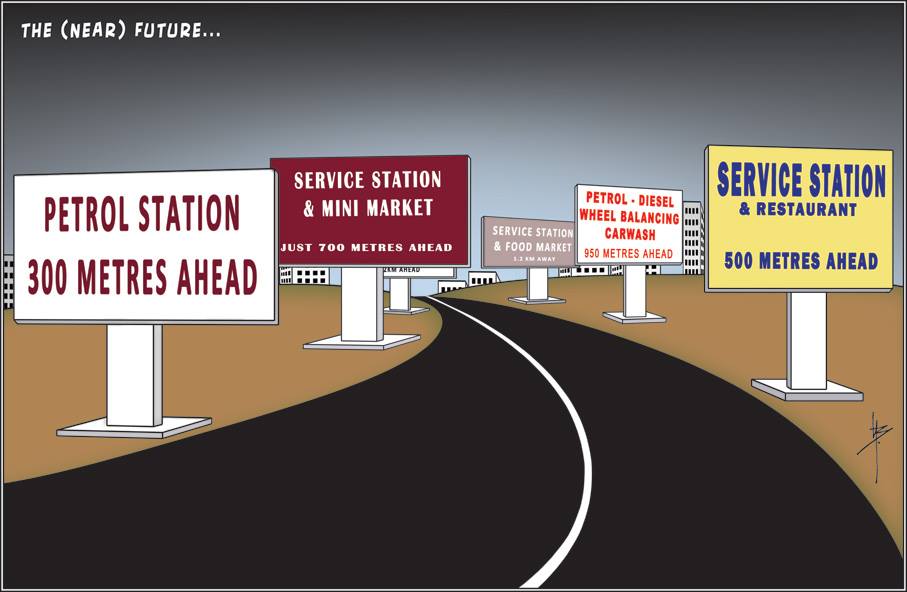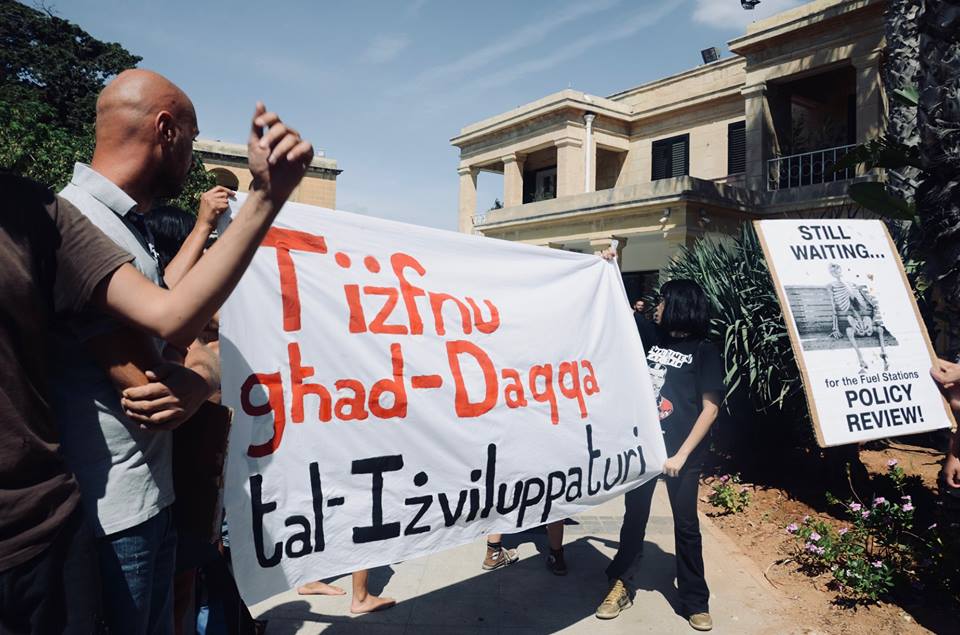
Since the introduction of the policy in 2015, there have been at least 14 applications for new or relocated stations on ODZs. Four applications have already been approved, and the others are still being processed under the current, unrevised policy.
by Victoria Pisani and Raisa Galea
Cartoon by Steve Bonello
[dropcap]R[/dropcap]aisa Galea speaks with Victoria Pisani, an activist at Moviment Graffitti and Kamp Emerġenza Ambjent, about the infamous fuel stations policy which has never been revised, despite the Planning Authority’s promise to do so.
Raisa Galea: Victoria, the issue of fuel station policy has been on the headlines for a while, mainly due to the activism of Moviment Graffitti. Could you please explain why all of the Maltese residents should pay attention to the issue? How does the approval of more and more fuel stations affect everyone?
Victoria Pisani: First and foremost, we are a very small country—and one of the most built up countries in Europe. This is one particular reason to care about how the land and space are used here: we are wasting precious agricultural Outside Development Zone land. However, misuse of land in a country where it’s scarce is only part of the problem. Another reason to demand a revision of this faulty policy is the injustice it entails: it favours developers and allows construction of large shopping complexes on ODZ (no fuel station needs to be 3,000 square meters), while a regular citizen has to abide by strict rules when it comes to managing their property, be it land or a balcony.
In a nutshell, this policy is an opportunity for developers to extract value from land which otherwise could be fairly used, but most definitely is not being used in this way. So the reasons to give importance to this matter are not limited to the environment and land uptake in a small country; they also include standing up to injustice and preferential treatment.
And what are the numbers? How many new petrol station applications were submitted in the past two years? And how many of them were approved?
Since the introduction of the policy in 2015, there have been at least 14 applications for new or relocated stations on ODZs. Four applications have already been approved—in Luqa, in Magħtab, in Burmarrad and Marsascala—and the others are still being processed under the current, unrevised policy.
Ironically, this fuel station policy clashes with the statement of Prime Minister Joseph Muscat, who said that Malta could become an electric car nation in as soon as seven years’ time. Some applications seem utterly ridiculous since they suggest having another station not far from the existing ones. What do you think is the reason for this outpour of applications? Do you think that, if approved, petrol stations will be followed by more development and this would eventually lead to urbanisation of the area and erosion of ODZ?
Yes, not only does the current Fuel Service Station Policy allow, but even incentivise, these stations with its absurd regulations. For example, the minimum distance allowed between two petrol stations is 500 metres. Frankly, the term “fuel station” is a mere euphemism, an excuse to build large commercial establishments of up to 3,000 square metres in size (a ridiculous size for a petrol station).
What is actually happening is that more and more areas are being taken up by these shopping complexes and yes, this means more urban sprawl. Moreover, this policy has rendered ODZ meaningless; Outside Development Zone has become synonymous with “giving value to developers”.
Basically, this policy allows making enormous profits from former agricultural land. Prior to development, a plot of land would be relatively cheap, but after the development its value would increase tremendously. And that’s the aim of the game.
It is indeed about making enormous profits. These ‘fuel stations’ also often include shops, ATMs, parking slots, VRT service, truck service and tire service. All of those certainly yield enormous profits.

Moviment Graffitti has been leading a campaign for petrol station policy change. There have been protests which attracted a lot of public attention, and the public seemed to be supportive of the cause. Has there been any progress on this matter from the Authority’s side?
Over the past year we had two direct actions—one in April and another in September—whose aim was to demand a revision of the policy.
Unfortunately, although in November 2018 the Planning Authority’s Executive Chairperson Johann Buttigieg stated that a draft review of the policy was ready to be issued for public consultation, we haven’t seen this revised policy yet.
In April 2018, the Environment and Resources Authority (ERA) completed their review of the policy, making it clear that fuel stations should not be allowed on ODZ. However, Minister for Transport, Infrastructure and Capital Projects Ian Borg has recently declared that the revised policy may actually still permit ODZ fuel stations after all. Again, recommendations made by ERA are falling on deaf ears!
Still, we are glad that our actions have shed light on this matter—not only on individual application, but the policy which enables them. Moviment Graffitti is urging the PA to publish the revised draft of the policy for public consultation immediately. We are also asking for a fixed deadline: when will the revised policy finally come into effect? Without a deadline, making promises to revise the policy makes no sense, especially since the applications for more ‘fuel stations’ are being submitted and processed as we speak.
We hope that the PA responds to these requests. However, Moviment Graffitti is committed to take more action if they remain ignored.
We are also asking for a fixed deadline: when will the revised policy finally come into effect? Without a deadline, making promises to revise the policy makes no sense, especially since the applications for more ‘fuel stations’ are being submitted and processed as we speak.
Given the feedback that your direct actions have received, do you think the general public supports your demands?
Yes, I would say so. We received positive and encouraging feedback following the video on the status of the policy and its impact on the land which was released in January. Many people think that allowing ‘fuel stations’ on ODZ land is outrageous, even if they are not necessarily in favour of electric cars.
We cannot ignore the fact that farming is, unfortunately, a dying profession. Farmers themselves often tell their children not to follow in their footsteps. This means that farmers are willing to sell their land for development or seek another use for their land. How can a proposed policy change ensure than farmers are not left out?
Yes, I certainly agree that Malta should establish policies designed to help farmers face current challenges. Not only is the current Fuel Service Station Policy not beneficial to farmers, it is harmful, especially in the long run.
Small policy changes cannot fix the damage done by the harsh realities of an economic model based on competition, which is not helping to sustain our agriculture. Local farmers already have to compete with imported produce, and the erosion of ODZ will make farming ever more challenging. Farmers should be getting all the financial help they require to sustain a living from their land, but instead the current policy is killing farmers’ livelihoods by conditioning them to sell their land for cheap so that commercial enterprises could profit enormously off this same land.
The current policy benefits neither farming, nor farmers, nor our wellbeing in general.
Leave a Reply